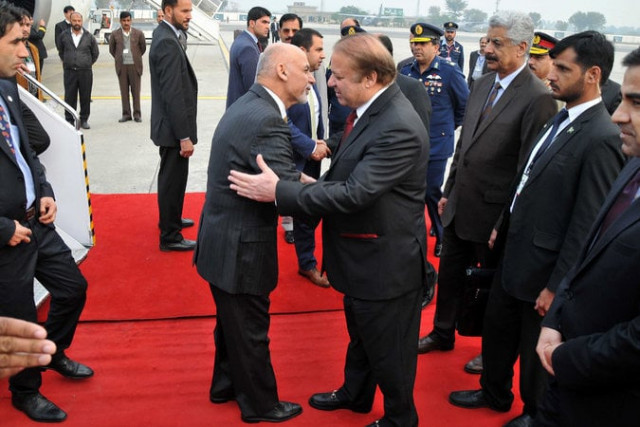At the heart of Asia
For Afghanistan and Pakistan, a reboot of the peace process in the former country is of paramount importance

Prime Minister Nawaz Sharif of Pakistan, right, greeted President Ashraf Ghani of Afghanistan, left, in Rawalpindi, Pakistan, on Wednesday. PHOTO: AFP

The Afghan Foreign Minister Salahuddin Rabbani, speaking of the moot said that the idea of conflict resolution through peaceful means was at the heart of the 43-point declaration issued by participants. For Afghanistan and Pakistan, a reboot of the peace process in the former country is of paramount importance. Hope was expressed that there would be positive developments on this front in “a few weeks”, but nobody was prepared to commit to a timeframe, a venue, a list of participants or an outline agenda.
The death of Mullah Omar, belatedly announced in July this year, has triggered a succession crisis within the Afghan Taliban that has yet to be conclusively resolved. The Taliban themselves may not be strongly inclined towards negotiation as they have had a very successful fighting season that saw them briefly take — but not hold — the northern city of Kunduz. Their suicide bombers have struck across the country and the Kandahar airport has been attacked. The Taliban have demonstrated an enduring capacity to mount complex operations and no party at the HOA-IP mentioned, at least in public, the Haqqani network. There has been no word from any of the various iterations of the Taliban as to their commitment to or willingness to engage in any peace process either, which renders the hopes of HOA-IP something of an irrelevance. Peace is only going to come about if all parties want it, and it is far from clear that that is the case.
As if engaging the Taliban in peaceful dialogue were not difficult enough, during the course of the HOA-IP, the head of Afghanistan’s leading intelligence agency resigned in protest at some of the remarks made by President Ghani at the opening of the conference. The reason for his seemingly sudden resignation appears linked to his frustration with Pakistan, which he claims is supporting “anti-government elements in Afghanistan”. It is reported that President Ghani has accepted his resignation. He has in the last week sacked a slew of intelligence officials in Kunduz for their failure to predict the Taliban attack and effectively counter it (the Taliban had surrounded the city for months) and it would be fair to say that the entire Afghan intelligence system is in considerable disarray.
For Pakistan, at the heart of Asia, there is both threat and opportunity. Balancing the two is going to determine many things, not least the future security and development of the nation and in particular the development and security of Afghanistan and India. The old playbooks are no longer relevant, as is the thinking that underpinned them and if Pakistan is playing both ends against the middle in Afghanistan, then it needs to stop. Pakistan has the potential to play a pivotal role regionally in the coming years, but only if it is willing and capable of adapting to changes in geopolitical weather. The coming year will tell.
Published in The Express Tribune, December 12th, 2015.
Like Opinion & Editorial on Facebook, follow @ETOpEd on Twitter to receive all updates on all our daily pieces.














COMMENTS
Comments are moderated and generally will be posted if they are on-topic and not abusive.
For more information, please see our Comments FAQ